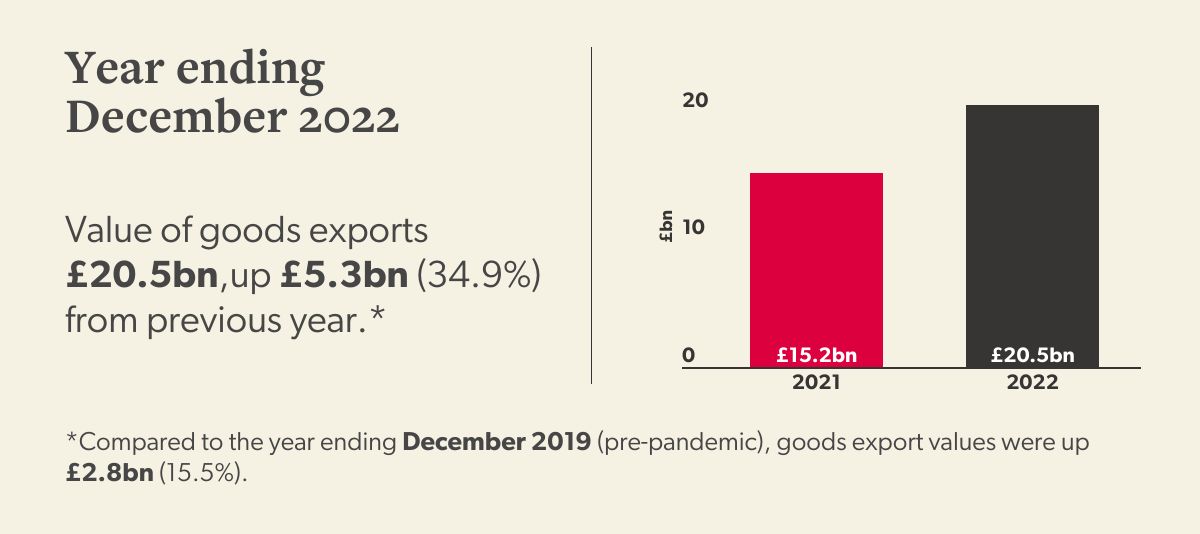Wales has long traded successfully on the world stage. Despite the major challenges of the last few years, Welsh exports continue to grow. In the year ending December 2022, the value of goods exports was £20.5 billion, up £5.3 billion (34.9%) from the previous year. Compared to the year ending December 2019 (pre-pandemic), 2022 goods export values were up £2.8 billion (15.5%).

Exporting is vital to the Welsh economy and has many potential benefits for small businesses. We spoke to Tony Hicks, Senior International Trade Adviser at the Welsh Government, about the opportunities and challenges for businesses, as well as the wide range of support available to help businesses start or progress their export journey. Here’s what he told us.
What are the opportunities and benefits of exporting?
There are a number of proven benefits of exporting for businesses. It extends their ability to increase sales and their customer base, allowing their products and services to reach their full potential. It can also help a business become more resilient by spreading risk across multiple markets. For example, a company that exports to international markets may be less adversely affected by a downturn in the domestic market.
Research shows that exporters are generally more productive and innovative in nature, with the ability to react to different customer needs and demands, and they tend to pay higher wages. The specific opportunities that exporting presents for a company depends on the nature of the business and the products and services it offers. It’s crucial to do research and access support where needed, as this reduces the potential for mistakes to be made.
What are the key barriers and challenges of exporting that businesses should consider?
One of the main challenges for businesses beginning to export or ramping up their exports is simply around having the capacity and financial resources. Exporting brings extra costs initially, and it requires people within the business to dedicate time to it and to gain export-specific skills. Successful exporting also requires regular international travel either to meet new or existing customers and partners or to explore new markets and showcase your products or services at international trade shows. In addition, in many parts of the world, you will need to spend time and resources on building effective and trusting relationships with your local partners which again brings additional overheads.
Having the necessary skills and knowledge is also an important consideration. For example, there are some very technical terms and issues related to shipping particular products, from VAT implications to trade terms. Compliance with Rules of Origin, export licence controls, customs requirements and export finance processes are other areas that need to be understood by businesses when exporting. Thankfully, there is a lot of help available with skills development, for example through the Welsh Government’s Flexible Skills Programme which provides funding support to Wales-based businesses that wish to attain accredited export related skills. In addition, the Welsh Government operates an annual programme that is focussed on supporting a cohort of companies that have either not exported before or have only exported intermittently to sell their goods or services around the world. Successful applicants receive support from experienced mentors to develop their knowledge, understanding, and capability for exporting, and to help them develop an export strategy.
How does a business know when it’s ready to start exporting?
We often find that businesses get into exporting accidentally. They’ll start receiving online enquiries from other parts of the world and realise there is overseas interest in their product or service, and then they start making some initial investigations into exporting. Or sometimes a business may find that it has saturated the local market and therefore looks to expand its market potential through exporting. Every company’s export journey is different, and that’s why it’s important to get outside expertise to help you develop an individual export strategy. Again, the Welsh Government and its export ecosystem partners, including the Department for Business and Trade, are able to help businesses at whatever stage they are on their export journey, ranging from new or fledgling exporters through to experienced exporters.
What are your top tips for businesses?
My number one tip for SMEs in Wales who are looking to begin exporting or to grow their exports is to get in touch with your local Welsh Government International Trade Adviser (ITA). I head up a team of ITAs, based in various locations around Wales. We work with eligible Welsh businesses on a one-to-one basis, providing them with advice, guidance, and support to help them achieve their export-related aims and objectives. We also play a key role in delivering the Export Development Cluster and New Exporter programmes, and we accompany and support delegations of Welsh businesses on key overseas trade missions and exhibitions, helping to maximise the opportunities for those attending.
To find out who your local ITA is, contact the export team through the Business Wales website.
What other support is available to businesses?
On the Business Wales website, you will also find a range of resources, including detailed guides on export topics, online training courses and webinars, information on upcoming events, and access to the ‘Export Hub’, which is home to a wealth of knowledge and data on all aspects of exporting.
We also work closely with key partners including the Development Bank of Wales to nurture the export ecosystem here in Wales and collectively provide businesses with the export support they need.
Funding to help you on your export journey
At the Development Bank of Wales, we can support businesses with finance to help them expand into new markets.
The benefits of exporting are clear among the businesses we’ve supported. Businesses in our 2022/23 impact of investment sample that exported experienced an average 77% productivity increase, meaning that turnover per FTE increased on average by 77% for those that export. This compares to 48% for the rest of the 2022/23 impact of investment sample.
Exporters were more likely to be innovating compared to the rest of the 2022/23 impact of innovation sample. Of the exporters, 32% were undertaking innovation activity in the year. Innovation activity includes collaborative R&D projects, registering patents, adopting new to firm products/services and new to market products/services.
If your business is looking to sell overseas and you need finance to help, please get in touch with us.


